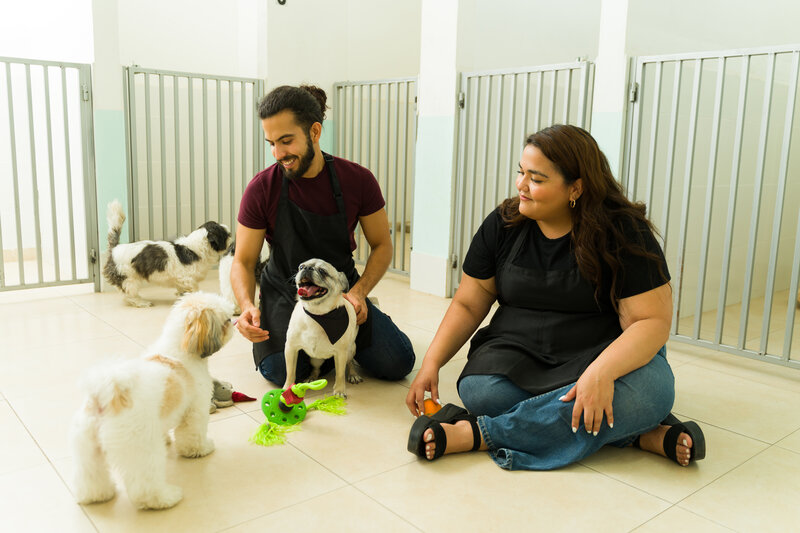
How much time does your dog spend alone at home? If you’re gone most of the day, or you work from home and are largely unavailable for playing or walking, why not give your beloved dog the gift of doggy daycare or a professional dog walker?
That’s right! Both of your lives are improved when you start taking advantage of doggy daycare or professional dog walking services. Both are customizable to your schedule so you can use these options Monday through Friday or just a day or two per week. Use the same care when choosing a dog trainer or pet sitter - and always check their current references.
Depending on the facility or dog walker’s schedule, drop-in options (or last-minute scheduling) may be available, but that varies.
Some dogs are indeed less energetic than others, and older dogs certainly wind down with age. However, we’ve rarely met a dog that’s happy to lay around without stimulation or exercise day after day. Dog owners are surprised at how much happier their dogs are when they can access the regular benefits of doggy daycare or dog walking services.
NOTE: Some dogs are more social than others. Therefore, we recommend trying both out and seeing which feels like the best fit. Doggy daycare can be overwhelming for some dogs so professional dog walking may be the better option for your pooch.
The amount of exercise a dog needs varies from breed to breed and temperament to temperament. However, most dogs do best with a minimum of 30 minutes of daily exercise twice a day. Most prefer more along the lines of an hour of exercise, play, and rigorous activity. And working dogs need as much as two or more hours to be on their best behavior when back inside the house.
The second part of this equation is that humans who know their furry companions are getting adequately exercised eliminate the guilt factor of knowing they should get out there and walk their dog even though it doesn’t happen as often as it should.
In addition to helping dogs remain calmer and less stressed in the house, exercise is essential to their health. Well-exercised dogs maintain a slimmer physique and are at less risk for heart disease, diabetes, and other common dog ailments.
Preventing your dog from developing diseases related to obesity or being underexercised also reduces their chances of being on medications to manage those diseases - which come with their own list of undesirable side effects.
Dogs are pack animals and do best when able to spend time around a variety of dogs, people, and various settings. This is why we recommend socializing your dog early and often for the rest of their lives. Dogs that live at home - and stay at home - most of the time are far more apt to be timid or aggressive when introduced to new people or dogs. They may also bark far more often because anything new or different sets off a “stranger danger” or alarm bell in their head.
When enrolled in doggy daycare or regularly walked with a dog walker, they are introduced to new people and new scenery. They also get to interact and play with other dogs, whether on the doggy daycare’s playground, walking in a dog walker’s pack, or visiting community dog parks.
All that lack of exercise can become internalized in a dog, and that manifests in undesirable behaviors linked to anxiety. An underexercised dog may exhibit symptoms of anxiety even if they have a human companion or two at home with them all the time. If you are gone from the house for much of the day, and the dog is left alone, they may get bored and become destructive. Especially if they are not used to being separate from the owner.
In either case, the daily dose of attention, interaction with humans and other dogs, and the exercise they get as a result of all that playtime eliminates or drastically reduces an anxious dog’s unwanted behaviors.
People who run high-quality doggy daycares or who work as professional dog trainers are innately good with dogs. So, in addition to being better exercised and less anxious, your dog picks up some good manners along the way. In most cases, dogs who regularly spend time with canine professionals learn to respond to basic commands, like sit, stay, come, etc. This makes them better behaved at home and wherever they might accompany you on adventures, outings, or vacations.
That said, some require that dogs know basic commands beforehand or as a prerequisite for their services. If that’s the case, consider taking group classes, one-on-one training, or doggy boot camp ahead of time, so your pup is ready for the new routine.
Are you interested in doggy daycare or dog walking options? Does your dog need help getting used to a collar and leash or learning the basic commands? Schedule a consultation with Alternative Canine Training. In addition to preparing your dog for the next big adventure, we provide referrals for the best doggy daycare and professional dog walkers in the area.